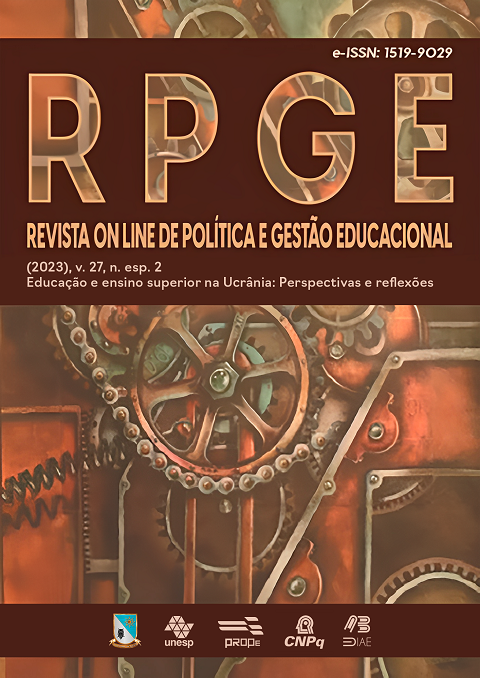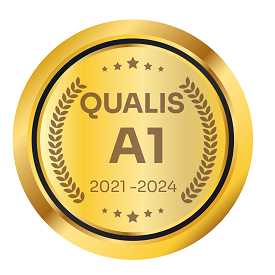Sobre o desenvolvimento do ecossistema digital no domínio da educação e da ciência
Tendências digitais na atualidade
DOI:
https://doi.org/10.22633/rpge.v27iesp.2.18723Palabras clave:
Educación digital, Innovaciones, TIC, Educación 4.0, Ciencia 4.0Resumen
El objetivo de la investigación es poner de relieve los componentes estructurales, organizativos, mentales e ideológicos del ecosistema digital del espacio educativo y científico. La tarea del estudio es analizar la integración del potencial digital del sistema educativo. La metodología utilizada en el artículo se basa en enfoques metodológicos científicos generales, principalmente analíticos. Los principios sinérgicos e interdisciplinarios pretenden fundamentar la influencia mutua de las herramientas digitales y las directrices educativas y científicas. Los resultados del estudio indican la necesidad de un nuevo posicionamiento del elemento TIC como elemento de pleno derecho del entorno educativo y científico. Las tendencias digitales modernas están pasando del estatus de innovación y popularización al formato de aplicación práctica en la educación y la ciencia. Así, el ecosistema digital está adquiriendo el estatus de componente fundamental del ámbito educativo y científico, garantizando el dinamismo, la movilidad y el pragmatismo.
Descargas
Citas
ABAD-SEGURA, E., et al. Sustainable Management of Digital Transformation in Higher Education: Global Research Trends. Sustainability, [S. l.], v. 12, n. 5, p. 2107, 2020. DOI: 10.3390/su12052107. Disponível em: https://www.mdpi.com/2071-1050/12/5/2107. Acesso em: 15 jul. 2023.
ALENEZI, M. Deep Dive into Digital Transformation in Higher Education Institutions. Education Sciences, [S. l.], v. 11, n. 12, p. 770, 2021. DOI: 10.3390/educsci11120770. Disponível em: https://www.mdpi.com/2227-7102/11/12/770. Acesso em: 15 jul. 2023.
AULKEMEIER, F.; IACOB, M. E.; VAN HILLEGERSBERG, J. Platform-based collaboration in digital ecosystems. Electronic Markets, [S. l.], v. 29, p. 597-608, 2019. DOI: 10.1007/s12525-019-00341-2. Disponível em: https://link.springer.com/article/10.1007/s12525-019-00341-2. Acesso em: 15 jul. 2023.
BAKHMAT, O. et al. Development of online and offline academic mobility of students in modern conditions. Revista Eduweb, [S. l.], v. 16, n. 3, p. 146-159, 2022. DOI: 10.46502/issn.1856-7576/2022.16.03.11. Disponível em: https://revistaeduweb.org/check/16-3/11-146-159.pdf. Acesso em: 15 jul. 2023.
BENAVIDES, L. M. C.; et al. Digital Transformation in Higher Education Institutions: A Systematic Literature Review. Sensors, [S. l.], v. 20, n. 11, 2020, p. 3291.
DOI: 10.3390/s20113291. Disponível em: https://www.mdpi.com/1424-8220/20/11/3291. Acesso em: 15 jul. 2023.
BODILY, R.; LEARY, H.; WEST, R. E. Research trends in instructional design and technology journals. BJET, [S. l.], v. 50, p. 64-79, 2019. DOI: 10.1111/bjet.12712. Disponível em: https://bera-journals.onlinelibrary.wiley.com/doi/abs/10.1111/bjet.12712. Acesso em: 15 jul. 2023.
BRANCH, J. W. et al. Digital Transformation in Higher Education Institutions: Between Myth and Reality. In: BURGOS, D. (org.). Radical Solutions and eLearning. Lecture Notes in Educational Technology. Springe: Singapore, 2022.
CORAL, M. A.; BERNUY, A. E. Challenges in the Digital Transformation Processes in Higher Education Institutions and Universities. International Journal of Information Technologies and Systems Approach (IJITSA), [S. l.], v. 15, n. 1, p. 1-14, 2022. DOI: 10.4018/IJITSA.290002. Disponível em: https://www.igi-global.com/gateway/article/290002. Acesso em: 15 jul. 2023.
GRANIĆ, A.; MARANGUNIĆ, N. Technology acceptance model in an educational context: A systematic literature review. BJET, [S. l.], v. 50, p. 2572-2593, 2019. DOI: 10.1111/bjet.12864. Disponível em: https://bera-journals.onlinelibrary.wiley.com/doi/10.1111/bjet.12864. Acesso em: 15 jul. 2023.
HRYNEVYCH, L. et al. Use of digital tools as a component of STEM education ecosystem. Educational Technology Quarterly, [S. l.], v. 6, 2021. DOI: 10.55056/etq.24. Disponível em: https://acnsci.org/journal/index.php/etq/article/view/24. Acesso em: 15 jul. 2023.
HRYTSENKO, A. Developing the Content of Forming the System of Intending History Teachers Professional Competence Using Multimedia Technologies. Revista Românească pentru Educaţie Multidimensională, [S. l.], v. 12, n. 1, p. 330-346, 2022. DOI: 10.18662/rrem/12.1sup1/238. Disponível em: https://lumenpublishing.com/journals/index.php/rrem/article/view/2449. Acesso em: 15 jul. 2023.
JURAEV, M.; AROYEV, D. Interdisciplinary integration is an important part of developing the professional training of students. Open Access Repository, [S. l.], v. 9, n. 1, p. 93-101, 2023. DOI: 10.17605/OSF.IO/H85SF. Disponível em: https://oarepo.org/index.php/oa/article/view/1237. Acesso em: 15 jul. 2023.
KODA, S.; et al. Innovative elements in distance learning in a multicultural environment. Amazonia Investiga, [S. l.], v. 11, n. 56, p. 232-239, 2022. DOI: 10.34069/AI/2022.56.08.23. Disponível em: https://amazoniainvestiga.info/check/56/23-232-239.pdf. Acesso em: 15 jul. 2023.
KOPP, M.; GRÖBLINGER, O.; ADAMS, S. Five common assumptions that prevent digital transformation at higher education institutions. INTED2019 Proceedings, [S. l.], p. 1448-1457, 2019. DOI: 10.21125/inted.2019.0445. Disponível em: https://library.iated.org/view/KOPP2019FIV. Acesso em: 15 jul. 2023.
KOSTENKO, L.; et al. Distance learning as an integrative response to contemporary challenges. Futurity Education, [S. l.], v. 3, n. 1, p. 151-164, 2023. DOI: 10.57125/FED/2022.10.11.12. Disponível em: https://futurity-education.com/index.php/fed/article/view/101. Acesso em: 15 jul. 2023.
KULICHENKO, A.; et al. Resistencia educativa bidimensional en el establecimiento educativo terciario moderno de Ucrania. Apuntes Universitarios, [S. l.], v. 13, n. 1, p. 474-493, 2022. DOI: 10.17162/au.v13i1.1351. Disponível em: https://apuntesuniversitarios.upeu.edu.pe/index.php/revapuntes/article/view/1351. Acesso em: 15 jul. 2023.
LELEKA, V.; et al. Innovative approaches to teaching students in the modern educational information environment in the USA and Great Britain. Amazonia Investiga, [S. l.], v. 11, n. 60, p. 156-166, 2022. DOI: 10.34069/AI/2022.60.12.17https://doi.org/10.34069/AI/2022.60.12.174. Disponível em: https://amazoniainvestiga.info/index.php/amazonia/article/view/2221. Acesso em: 15 jul. 2023.
MÁRTON, A. Steps toward a digital ecology: ecological principles for the study of digital ecosystems. Journal of Information Technology, [S. l.], v. 37, n. 3, p. 250-265, 2022. DOI: 10.1177/02683962211043222. Disponível em: https://journals.sagepub.com/doi/10.1177/02683962211043222. Acesso em: 15 jul. 2023.
NGUYEN, A. et al. Ethical principles for artificial intelligence in education. Education and Information Technologies, [S. l.], v. 28, p. 4221-4241, 2023. DOI: 10.1007/s10639-022-11316-w. Disponível em: https://link.springer.com/article/10.1007/s10639-022-11316-w. Acesso em: 15 jul. 2023.
OLEKSIIENKO, A. et al. An analysis of the digital university phenomenon: dilemmas, new opportunities. Futurity Education, [S. l.], v. 2, n. 4, p. 18–25, 2022. DOI: 10.57125/FED.2022.25.12.02. Disponível em: https://futurity-education.com/index.php/fed/article/view/77. Acesso em: 15 jul. 2023.
RAK-MŁYNARSKA, E. Analysis of trends in the development of the educational environment: education of the future. Futurity Education, [S. l.], v. 2, n. 2, p. 4-13, 2022. DOI: 10.57125/FED/2022.10.11.24. Disponível em: https://futurity-education.com/index.php/fed/article/view/51. Acesso em: 15 jul. 2023.
RASCHKA, S.; PATTERSON, J.; NOLET, C. Machine Learning in Python: Main Developments and Technology Trends in Data Science, Machine Learning, and Artificial Intelligence. Information, [S. l.], v. 11, n. 4, p. 193, 2020. DOI: 10.3390/info11040193. Disponível em: https://www.mdpi.com/2078-2489/11/4/193. Acesso em: 15 jul. 2023.
ROMANUKHA, О.; UDOVICHENKO, H.; ZINCHENKO, V. Features of the use of emodia in the study of humanitarian disciplines at the example of history. Society. Integration. Education. Proceedings of the International Scientific Conference, [S. l.], v. 2, p. 280-291, 2020. Disponível em: http://journals.rta.lv/index.php/SIE/article/view/4905. Acesso em: 15 jul. 2023.
SARNOK, K.; WANNAPIROON, P.; NILSOOK, P. Digital Learning Ecosystem by Using Digital Storytelling for Teacher Profession Students. International Journal of Information and Education Technology, [S. l.], v. 9, n. 1, 2019. DOI: 10.18178/ijiet.2019.9.1.1167. Disponível em: https://www.ijiet.org/show-109-1356-1.html. Acesso em: 15 jul. 2023.
SAS N. Fundamentals of innovative management of educational institutions. Lap Lambert Academic Publishing, 2013. Disponível em: https://lap-publishing.com/. Acesso em: 15 jul. 2023.
SUBRAMANIAM, M.; IYER, B.; VENKATRAMAN, V. Competing in digital ecosystems.
Business Horizons, [S. l.], v. 62, n. 1, p. 83-94, 2019. DOI: 10.1016/j.bushor.2018.08.013. Disponível em: https://www.sciencedirect.com/science/article/abs/pii/S0007681318301484?via%3Dihub. Acesso em: 15 jul. 2023.
TRIPATH, P. et al. Challenges, impacts and the importance of digital technologies on modern education in 21st century. European Chemical Bulletin, [S. l.], v. 12, p. 17282-17293, 2023. DOI: 10.48047/ecb/2023.12.si4.1539. Disponível em: https://www.researchgate.net/publication/371947581_CHALLENGES_IMPACTS_AND_THE_IMPORTANCE_OF_DIGITAL_TECHNOLOGIES_ON_MODERN_EDUCATION_IN_21ST_CENTURY. Acesso em: 15 jul. 2023.
TSEKHMISTER, Y. Education of the future: from post-war reconstruction to EU membership (Ukrainian case study). Futurity Education, [S. l.], v. 2, n. 2, p. 42-52, 2022. DOI: 10.57125/FED/2022.10.11.28. Disponível em: https://futurity-education.com/index.php/fed/article/view/57. Acesso em: 15 jul. 2023.
VALDEZ-DE-LEON, O. How to Develop a Digital Ecosystem: a Practical Framework. Technology Innovation Management Review, [S. l.], v. 9, n. 8, p. 43-54, 2019. DOI: 10.22215/timreview/1260. Disponível em: https://timreview.ca/article/1260. Acesso em: 15 jul. 2023.
WANG, Y. et al. Exploring the Landscape of Digital Health in Sport Science: A Bibliometric Analysis of Global Research Trends and Future Directions (2010-2023). Preprints.org 2023, [S. l.], v. 1, p. 2023060001, 2021. DOI: 10.20944/preprints202306.0001.v1. Disponível em: https://www.preprints.org/manuscript/202306.0001/v1. Acesso em: 15 jul. 2023.
Descargas
Publicado
Cómo citar
Número
Sección
Licencia
Derechos de autor 2023 Revista on line de Política e Gestão Educacional

Esta obra está bajo una licencia internacional Creative Commons Atribución-NoComercial-CompartirIgual 4.0.
Manuscritos aceitos e publicados são de propriedade da Revista on line de Política e Gestão Educacional. É vedada a submissão integral ou parcial do manuscrito a qualquer outro periódico. A responsabilidade do conteúdo dos artigos é exclusiva dos autores. É vedada a tradução para outro idioma sem a autorização escrita do Editor ouvida a Comissão Editorial Científica.











